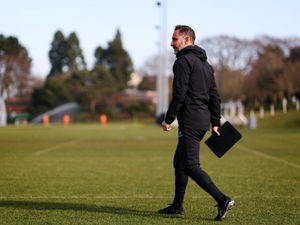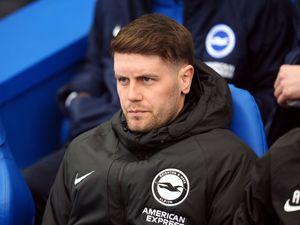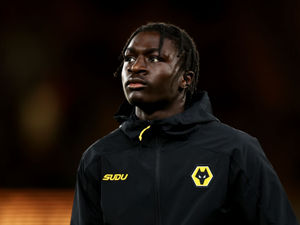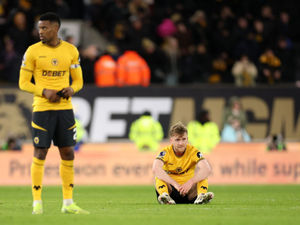How Steve Daley’s transfer record became his breaking point
Ask Steve Daley how long it took to realise that his record-breaking move from Wolves to Manchester City wasn’t going to go as swimmingly as he had hoped and the response is instant...writes Paul Berry.
“Well we kicked off on my debut at 3 o’clock on a Saturday….so maybe seven minutes past?”
All who have had the pleasure to listen to Daley’s brilliantly hilarious after-dinner speech over the last two decades will know that he quite readily laughs both at himself and the abject misfortune which transpired after becoming Britain’s most expensive footballer.
“I went up to do one of the very first dinners after the Etihad had opened, in front of 400 Manchester City fans,” he recalls.
“I don’t mind saying – I was bricking it.
“But when I was introduced, I got a standing ovation, it was brilliant.
“I told them I bet they never expected to have to pay to see me again…”
Or how about: “I remember once being voted the biggest waste of money in football history.
“What an honour! Best thing is, they did the vote a second time a few years later….and I won it again!”
And then: “One of the worst games was when we lost in the FA Cup at Halifax, and with a few minutes left the boss decided to make a substitution.
“I looked over and the number 11 went up and I thought, ‘bloody hell, he’s taking us all off’!”
And so, as Wolves prepare for Stoke in the Carabao Cup before the launch their home Premier League campaign against Manchester City on Monday night, for many fans of a certain age – and not just in those two cities - there is one name which remains inextricably synonymous with both clubs...Stephen Daley.
For all the self-deprecating humour and the way Daley ultimately managed to transform such a negative experience into a learning process, it is worth remembering that this was a seriously turbulent time for the Barnsley-born midfielder.
As one of the most coveted creative talents in England at the time, in the prime of a Wolves career that had been one long and still developing success story, the ‘Daley Express’ was in full flow.
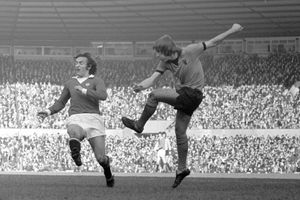
Little wonder he was attracting interest from a multitude of clubs in the First Division, effectively creating an auction which saw City smash the transfer record set when Trevor Francis had become Britain’s first million pound player when moving from Birmingham to Nottingham Forest seven months earlier.
“September 5th, 1979, one million four hundred and thirty seven thousand, five hundred pounds…”. Daley regularly repeats the fee with metronomic accuracy.
Unfortunately though, as the world now knows, the move went nowhere near to plan, affecting Daley to such an extent that it wasn’t just his career under threat, it was also his life.
This was a footballing era without agents, without the sizeable backroom teams and psychological support now evident at most Premier League clubs, and without the sort of infrastructure which quite rightly offers players support with their mental health should the need ever arise.
So when Daley received death threats, or indeed even considered doing that particular job himself as his self-esteem alarmingly plummeted, it was only his own strength and the support of wife Lyn and friends and family which carried him through.
For all the humour, it remains a salutary tale. And it was one which had started amid such promise.
“Thinking back to that time, I was by no means unhappy at Wolves, but there was a lot of interest in me, and Manchester City were a team packed with international players who were doing well in the league,” Daley recalls.
“I loved my time at Wolves, but it was a situation where it just looked like a fresh and exciting challenge, to see if the grass was a little bit greener on the other side.
“In the weeks building up to the move I was getting interest from everywhere and I had calls from Arsenal, Ipswich, Manchester United, Chelsea, Newcastle.
“When that many clubs show interest in you, then you can get dragged along with the momentum of it all, and that is what happened with me.
“The bidding started, and Wolves kept hiking it, as they wanted the money to go and buy Andy Gray, and eventually it reached almost one-and-a-half million pounds.
“It’s ludicrous isn’t it? But what could I do?
“Wolves wanted to sell me and get the best deal they could and if Manchester City wanted me that badly they were going to pay the money which Wolves were after.
“I had a tip-off that the deal had been done, and so when I was called in to see John Barnwell, and he told me it had been agreed, I was expecting it.
“I got in my Ford Cortina, borrowed a tenner from Wolves club secretary Phil Shaw, headed up the motorway and within a couple of hours had completed a medical and signed a ten-year contract.”
And from there? Well that’s history. Manchester City history.
Boss Malcolm Allison was leading the club through a transition, and some key players whom Daley was hoping to play alongside – including Gary Owen, Peter Barnes and Mick Channon – moved on.
Of course other new players arrived, and there was plenty of quality within the squad, but for Daley, the move just never took off.
It may have taken longer than seven minutes, but nothing went right, and, the harder he tried, the worse it became.
City finished 17thin the league, with that Halifax cup giantkilling thrown in for good measure, and within 20 months of his arrival, Daley was gone, off to Seattle Sounders in the North American Soccer League for a much reduced £300,000 fee after making 53 appearances, scoring four goals.
It had been, without any fear of exaggeration, a nightmare, during which some fans – not all – had made Daley the subject of their wrath, and he also found himself firmly in the sights of sections of the national media.
“I loved the club, and was desperate for it to work, but the more I tried to make it happen, the worse it got,” he confirms.
“It was this transitional period, with Malcolm Allison trying to put his stamp on things, but the transition took far longer than expected.
“Yes the fans weren’t happy, and I had death threats, including one call saying I wouldn’t reach my 27thbirthday.
“Some of the media reports were also tough to take, including when someone said I wasn’t fit to be a father, when all I wanted to be was a great role model for my kids.
“It all reached a new low when we were losing 1-0 at Brighton and I got sent off late on, and the team went on to win 2-1 with ten men.

“The referee was part-time and his main job was a psychologist, and he came to find me after the game to apologise for sending me off and saying that when he looked in my eyes while making the decision, he could see there was nothing there anymore.
“That was the time to be honest, the time I actually thought about killing myself.
“It could have gone either way, but well, I am still here, and a lot of that is down to my family.
“Lyn was brilliant, she had to put up with so much with my moods and my negative thinking – she is my rock, but she’s from Bilston, and they are made of strong stuff aren’t they?
“As it became clear I was going to have to leave, Chelsea were interested, but we decided everything that had happened to me at City would linger on, and that is when the opportunity at Seattle Sounders came up.”
It wasn’t all hatred and vitriol at City however.
Daley still remembers a section of the Kippax Stand at Maine Road who always stayed with him, describing those fans as his ‘Mike Bailey’, backing him even when things were going wrong and imploring him to keep going.
There were also letters of support – lots of them – many from his home town in Barnsley.
‘We don’t recognise this Steve Daley they are talking about,’ people would write.
And at Seattle, fortunes turned around once again.
Working under a manager in former Wolves winger Alan Hinton, Daley was back to his best, and made the NASL Allstars team two years in succession.
“I think I proved something to myself and to people who might have looked at the Man City story and thought I was no good,” he says.
The Molineux faithful always knew Daley was very much the opposite to ‘no good’.
Having emerged via Wolves’ nursery club Wath Wanderers, Daley would go on to make 244 first team appearances across almost eight years, scoring 43 goals.
A debut goal against Southampton – ironically his City debut against the same club would end in defeat – scoring after just 20 seconds against Ferencvaros enroute to the 1972 FA UEFA Cup Final, an emphatic Player of the Year award as Wolves won the Second Division title in 1976/77.
Yes, Daley was far from being ‘no good’.
Indeed, just ahead of the move to Manchester City, he had been contacted by England manager Ron Greenwood about a potential senior call-up having impressed the then ‘B’ team boss Bobby Robson on a tour of the Far East.
That phonecall never came again.
“Wolves was brilliant and I played there with two of the best midfielders I have ever played with,” he explains.
“Kenny Hibbitt and Willie Carr.
“We had such an understanding, and I feel so lucky to have played alongside them.
“We have an incredible respect for each other – we trained together, played together, socialised together.
“There were never any questions asked, whatever we needed from each other out on the pitch we would do it.”
Therein lies the continuing appeal of Wolves, and the legacy of Daley’s time at Molineux, as team-mates became friends, and those friendships have endured.
Not just Hibbitt and Carr but Parkes, Palmer, Parkin. The two John’s, Richards and McAlle. Steve Kindon, Mel Eves.
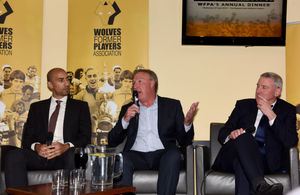
A Wolves band of brothers who played together and then stayed together with so many still living locally and offering each other support, especially during the trials and tribulations of lockdown over the last few months.
Daley remains a key figure with Wolves’ Former Players Association, particularly with the Annual Golf Day, one of a number of events which raises thousands for local charities but which has unfortunately, this year, been one of those fundraisers which fell victim to Covid.
Get them all back together, and immediately it is like being transported back almost 50 years to the Molineux dressing room with a bond and a camaraderie that hasn’t dimmed with the passage of time.
And now, as Daley acknowledges when turning attentions to the present and Monday’s big Molineux curtain-raiser, the successes of the current Wolves crop are perhaps raising comparisons with that Seventies team which would go on to win the club’s most recent major trophy, the 1980 League Cup.
“Wolves are an unbelievable side now,” he declares.
“Back in our day we would be compared to the teams of the Forties and Fifties with people like Billy Wright and when we hear people comparing today’s team to that of the Seventies it is an amazing show of respect.
“I was fortunate to do some pitchside interviewing for Wolves a couple of years ago and remember being at Nuno’s first match in charge against Middlesbrough.
“Not too many people knew about Nuno but you could tell straightaway that something was happening.
“I was stood with Jody Craddock as I was about to interview him at half time and we could both see it and I remember saying that it was just like watching Brazil.
“Players have come in but it is how Nuno has built the team and improved those like Traore, and what he has done with Conor Coady.
“I love Conor, I think he’s a great lad, an incredible pro and a fantastic player.
“To see that interview after he made his England debut told you everything you need to know about him and I have to say I think his call-up was long overdue.
“I have loved seeing Wolves do so well just as I have enjoyed Manchester City’s recent success.
“I mean that Kevin De Bruyne is some player isn’t he? It’s a good job he wasn’t around in my day – he wouldn’t have been so good if he had to play alongside me!
“Pep Guardiola has also done an incredible job there, but Wolves beat them twice last season and are now playing at a similar level and I think Monday will be another fascinating game.”
An hour-long chat at the socially-distanced clubhouse at Oxley Park Golf Club passes in an instant, as it always does when in Daley’s company.
There is a sense of small regret when looking back at the events of 41 years ago this month, and at times plenty of emotion, but not even a sniff of bitterness or rancour about what he experienced.
More so a strong and unshakeable feeling of pride and satisfaction of a career very well done and a life which he continues to savour.
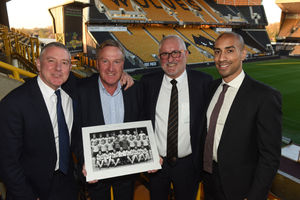
Family is now paramount for Daley – he and Lyn’s three children Kerry, Ryan and Gemma have given them ten grandchildren which makes for a lot of school runs and standing on junior football touchlines.
As a result his after-speaking commitments – for which he was named Speaker of the Year three times - have now finished, although the motivational presentation he has delivered to many schools, prisons, football academies (including Wolves) and other workplaces remains a passion.
Above all else he remains more than happy with his lot, and views the more turbulent times of his football as learning experiences for what was to follow.
“I can tell you this - I think about that move and what happened to me at Manchester City every single day,” says Daley.
“There is always something or someone that reminds me, and I always think, ‘if only it had worked’.
“But I haven’t got another chance, have I? Football is a short career and I didn’t have another opportunity to do it all again.
“Honestly, it taught me so many things in my life, it really did.
“You go through life and not everything that happens is great, there are always obstacles to overcome and even more so with what is happening to everyone at the moment.
“I have always told my kids and my grandkids: ‘There will always be positives and negatives, and you have to accept the positives and apply yourself to the negatives to try and make them into positives’.
“What happened to me I just have to put down to one of life’s experiences and I know how fortunate I have been for which I will always be immensely grateful.
“Because after all…how many people out there would have loved to have had the career that I had?”

